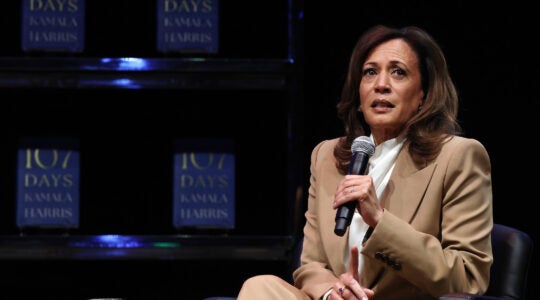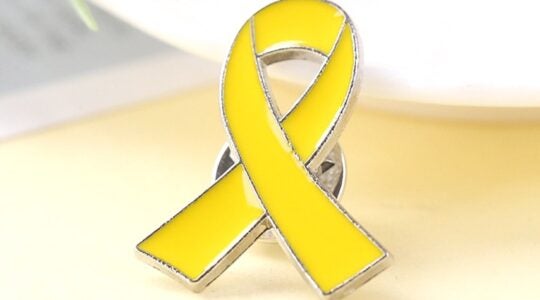WASHINGTON (JTA) – Two top donors to AIPAC are raising objections over its support for a congressional letter that urges the Bush administration to increase assistance to the Palestinian Authority.
Sheldon Adelson, a casino magnate ranked by Forbes as the third wealthiest American and the sixth wealthiest man in the world, told JTA he raised the issue in a phone call with Howard Kohr, the executive director of the American Israel Public Affairs Committee.
An active Republican, Adelson likened AIPAC to a friend assisting Israel’s suicide.
“If someone is going to jump off a bridge, it is incumbent upon their friends to dissuade them,” he told JTA. He added, “I love and admire the concept of AIPAC.”
Adelson’s criticism of the pro-Israel lobby comes as the Israeli government heads into U.S.-convened peace talks with the Palestinians in Annapolis, Md., later this month.
The objections to the letter underscore debates within the Jewish community over possible Israeli concessions to the Palestinians. It also illustrates the tension between AIPAC’s mandate to support Israeli policies and its need to navigate differences among its own constituents.
The other donor who has raised questions is Gary Erlbaum, a property developer prominent in the Philadelphia Jewish community. He said he would urge others to lobby against the letter.
“We should lobby our own congressmen never to sign the letter, unless there is clear evidence Palestinians have changed their educational system and have fought terrorism,” Erlbaum said.
The letter to U.S. Secretary of State Condoleezza Rice, which was to have been sent out Friday, was initiated last month by U.S. Reps. Gary Ackerman (D-N.Y.) and Charles Boustany (R-La.). So far, 118 of 435 members of the U.S. House of Representatives have signed, including 12 Jewish Democrats.
It casts increased assistance as necessary to help Mahmoud Abbas, the Palestinian Authority president, make the changes needed to guarantee Israel’s security.
“Addressing corruption and public safety in the P.A., while continuing to engage with Israel to coordinate a remittance schedule for Palestinian tax monies and to improve access and movement,” the letter states, “will ensure that assistance will be effective in reviving the Palestinian economy and creating the atmosphere of hope required for the success of diplomatic efforts.”
Neither Adelson nor Erlbaum would address whether AIPAC’s support for the letter would influence how they donate to the group. Speaking generally, Adelson said, “I don’t continue to support organizations that help friends committing suicide just because they say they want to jump.”
An AIPAC spokeswoman confirmed that both men are supporters of the organization and described Adelson as a “major” donor.
Adelson, with an estimated net worth of $26.5 billion, often contributes in the millions to favored Jewish causes. He donated $25 million last year to Yad Vashem, Israel’s Holocaust memorial, and gave birthright israel – the program that flies Jewish youth to Israel for free tours – $55 million over the past two years.
The casino magnate is believed to have pledged a significant portion of the money AIPAC is using to pay for its new seven-story premises, opening in February. His latest project is FreedomsWatch, a group promoting President Bush’s commitment to staying the course in Iraq; Adelson is believed to have contributed the bulk of the group’s $15 million startup costs. Erlbaum is also a backer of the new group.
Ackerman, who is Jewish, chairs the House’s Middle East subcommittee and has a close relationship with AIPAC. In the past year, however, he has wondered aloud whether Israel and the United States have missed opportunities by failing to encourage Palestinian moderates.
A coalition of three dovish groups – Brit Tzedek v’Shalom, Americans for Peace Now and Israel Policy Forum – joined the Arab American Institute, Churches for Middle East Peace and the American Task Force on Palestine in lobbying for the letter. Much was made at the outset of Ackerman being Jewish and Boustany being an Arab American.
AIPAC did not initially back the letter, something JTA reported on Oct. 19. Within days, however, AIPAC officials reached out to JTA to say the lobby decided to back the letter after assurances from Ackerman’s office that the money requested would be “project based” – a provision that guarantees strict oversight. AIPAC sought the assurances even though the letter makes explicit that the assistance is to be “project-focused.”
It is not clear what else was behind the switch. The Bush administration has launched a concerted effort to rally U.S. Jewish support for the Annapolis summit, which is slated to occur during the week of Nov. 26.
Separate from the Ackerman-Boustany letter, the White House surprised lawmakers last month with a new request for $410 million in extra funding for the Palestinians. AIPAC has yet to take a position on that request, which includes $150 million in non-specified funding.
On Capitol Hill, sources say AIPAC’s support for the Ackerman-Boustany letter appeared limited to telling lawmakers – and only if they call and ask – that the organization is on board, a significant difference from AIPAC’s usual full-frontal lobbying blitzes, which often garner majority support. Another recent AIPAC-backed letter urged the Bush administration to press Arab nations to reach out to Israel as a means of reinforcing peace talks; out of 100 senators, 79 signed.
Adelson told JTA that Kohr, AIPAC’s executive director, assured him on Tuesday that the group did not yet back the Ackerman-Boustany letter. AIPAC officials would not discuss the conversation between the two men, except to restate that AIPAC still supported the letter. They said that Kohr would not comment.
Erlbaum also called AIPAC officials; he said he was told AIPAC backed the letter, but not the Bush administration request for $410 million.
The news of the contretemps drew praise for AIPAC from an unexpected corner – Brit Tzedek, a group that considers itself a grassroots dovish alternative to the lobbying powerhouse.
“We are very pleased that AIPAC has stepped up in support of the Ackerman-Boustany letter, joining the overwhelming majority of American Jews who support a negotiated two-state solution to the Israeli-Palestinian conflict,” said Diane Balser, Brit Tzedek’s vice president.
Adelson, who recently launched a giveaway tabloid in Israel, said his research showed that vast majorities of Israelis opposed the concessions Olmert is reportedly considering, particularly sharing Jerusalem.
“Governments have to listen to the people – of course, Olmert was duly elected, but promises made” on not dividing Jerusalem “are being neglected,” Adelson said.
Rice has acknowledged pressing the sides toward a solution before her boss leaves the Oval Office. Still, Adelson would not criticize the Bush administration.
“The Bush administration and Condoleezza Rice can’t be holier than the pope if the government of Israel wants to accept the destruction of Israel,” he said.
Adelson and Erlbaum are also donors to the Zionist Organization of America, which has driven a campaign against any further funding for the Abbas-led Palestinian Authority.
“It is high time to condition any further U.S. aid on the Palestinians arresting terrorists, outlawing terrorist groups and ending incitement against Israel in their media, schools and speeches,” ZOA president Morton Klein said. “Otherwise, the message is sent that the U.S. is not serious about the Palestinians changing their actions.”
JTA has documented Jewish history in real-time for over a century. Keep our journalism strong by joining us in supporting independent, award-winning reporting.





